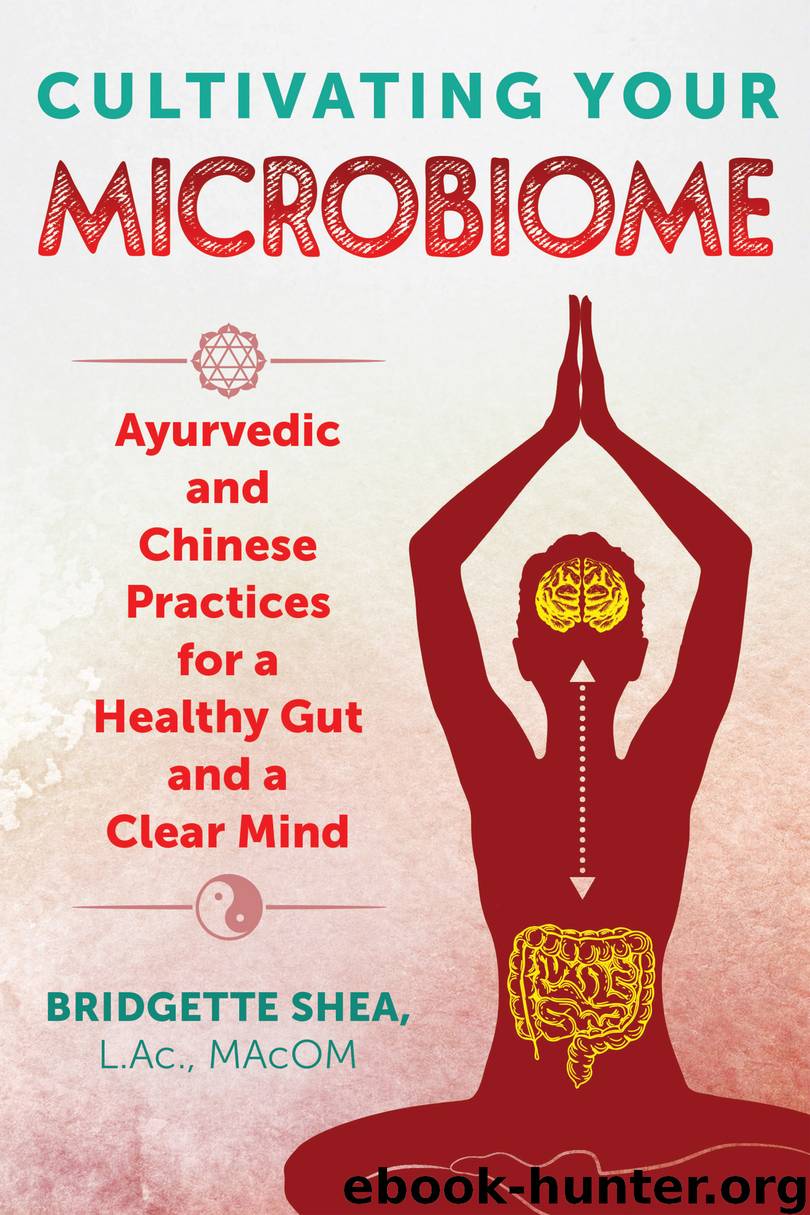Cultivating Your Microbiome by Bridgette Shea

Author:Bridgette Shea
Language: eng
Format: epub
Tags: Holistic Health
Publisher: Inner Traditions/Bear & Company
Published: 2020-07-21T16:00:00+00:00
Thinking involves the brain in the head and the brain in the belly.
Whether the medicine is from the East or West, the mental and emotional puppeteering from the large intestine may manifest from anything as extreme as a clinical diagnosis to something as seemingly innocuous, yet disturbing, as a fleeting sense of vague nervousness or anxiety without definitive cause. Modern science and medicine are finally recognizing the importance of our emotional and mental states on physical health in a way they previously hadn’t. This is all thanks to their discoveries pertaining to the gut microbiome.
Everything from simple emotional states to complex syndromes such as autism are being shown to have links to gut function. These mindgut links are largely being studied in the hope of devising appropriate psychobiotics—preand probiotic supplements filled with microbes found to positively influence gut-brain communications in the presence of psychological or brain diseases.6 Scientists have found that certain syndromes are linked with different states of dysbiosis, but the information they have is in its infancy and it’s unclear which came first: the syndrome or the dysbiosis. Regardless, in mouse studies it appears as though they’ve had relative success in treating mental/emotional symptoms of Alzheimer’s, autism, various bacterial infections, diabetes, and postinflammatory anxiety.7
In addition to the gut, there are other places in and around the body where microbial communities are in communication with the brain and influence our brain and/or mental state. These include the oral microbiome, which has recently been implicated in Alzheimer’s disease, as mentioned earlier in this book; and the aerobiome and exposome, which is the cloud of chemicals and microbes we emit and inhale, that has been shown to affect the mind as well. For example, researchers working on a device that measures the exposome have found that a substance we breathe causes us to feel joy.8
Many researchers and doctors have come forward in the past few decades who have recognized the mind-body connection. For example, stem-cell biologist Bruce Lipton produced studies of the connection between mind and body and found that gene expression can be influenced by the mind. His influence popularized a field of study called epigenetics. Current studies go both ways: how the microbiome is affecting our mental and emotional states, and conversely, how emotional states may affect the microbiome.
Download
This site does not store any files on its server. We only index and link to content provided by other sites. Please contact the content providers to delete copyright contents if any and email us, we'll remove relevant links or contents immediately.
Inner Engineering: A Yogi's Guide to Joy by Sadhguru(6785)
The Power of Now: A Guide to Spiritual Enlightenment by Eckhart Tolle(5760)
Fear by Osho(4727)
Ikigai by Héctor García & Francesc Miralles(4247)
The Art of Happiness by The Dalai Lama(4125)
The Ultimate Bodybuilding Cookbook by Kendall Lou Schmidt(3938)
Yoga Therapy by Mark Stephens(3742)
The Little Book of Hygge by Meik Wiking(3687)
The Healing Self by Deepak Chopra(3568)
Why Buddhism is True by Robert Wright(3446)
The Hatha Yoga Pradipika (Translated) by Svatmarama(3328)
Being Aware of Being Aware by Rupert Spira(3272)
Shift into Freedom by Loch Kelly(3194)
Wild Words from Wild Women by Stephens Autumn(3149)
Work Clean by Dan Charnas(3116)
Happiness by Matthieu Ricard(3040)
More Language of Letting Go: 366 New Daily Meditations by Melody Beattie(3024)
Yoga Body & Mind Handbook by Jasmine Tarkeshi(2874)
Why I Am Not a Feminist by Jessa Crispin(2748)
